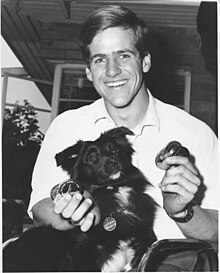Michael Dow
 From Wikipedia - Reading time: 3 min
From Wikipedia - Reading time: 3 min
 Michael Dow and his dog, Hitam, displaying his five Olympic medals from the 1964 Tokyo Paralympic Games | ||||||||||||||||||||||||||||||
| Personal information | ||||||||||||||||||||||||||||||
|---|---|---|---|---|---|---|---|---|---|---|---|---|---|---|---|---|---|---|---|---|---|---|---|---|---|---|---|---|---|---|
| Nationality | ||||||||||||||||||||||||||||||
Medal record
| ||||||||||||||||||||||||||||||
Michael Dow is an Australian Paralympic swimmer and weightlifter who won two gold, two silver and a bronze medal at the 1964 Summer Paralympics. He was one of only two Victorian athletes selected to compete at these games.
Biography
[edit]Dow contracted poliomyelitis at 4 years of age while living with his family in Borneo. The family moved to Venezuela in 1954 and returned to Melbourne Victoria in 1959.[1] His interest in sport developed through newspapers, that included articles about sporting opportunities for disabled people and achievements of people with spinal cord injuries.[2] In addition, the Victorian Paraplegic Sports Club supported local, national and international competitions for people with a disability which included the Victorian Championships held annually at Albert Park, The Australian Championships held bi-annually, and the Inaugural Commonwealth Games held in Perth Western Australia, in November 1962. This event is held every four years.[3]
Selection for the 1964 Summer Paralympics was based on Dow's outstanding results achieved at the National Championships. He competed in sprint, long-distance track, javelin, and weightlifting that was an Australian innovation, the program being developed in Perth.[4]
At the 1964 Summer Paralympics, he won two gold medals in the Men's 50 m Breaststroke incomplete class 3 and Men's 50 m Freestyle Supine incomplete class 3 events, a silver medal in Men's Weightlifting Featherweight event, a bronze medal in the Men's 50 m Freestyle Prone incomplete class 3 event.,[5] and a silver medal in the 4 x 60 metre wheelchair relay.[6]
Following his outstanding results at the 1964 Paralympics, Dow then decided to retire and concentrate on his studies.[7] In 1970, he completed his Bachelor of Arts Degree at Monash University Melbourne.[8]
Dow dropped out of competition for ten years, returned in 1979 and again in 1981 to compete in the Australian Paraplegic Championships. He then retired from competitive sport.[9]
References
[edit]- ^ Rob Hess, Matthew Klugman. THE FOUNDATION YEARS Disability Sport & Recreation. Victoria University October 2014.
- ^ Rob Hess, Matthew Klugman. THE FOUNDATION YEARS Disability Sport & Recreation. Victoria University October 2014.
- ^ Rob Hess, Matthew Klugman. THE FOUNDATION YEARS Disability Sport & Recreation. Victoria University, October 2014.
- ^ Rob Hess, Matthew Klugman. THE FOUNDATION YEARS Disability Sport & Recreation. Victoria University, October 2014.
- ^ "Athlete Search Results". International Paralympic Committee. Retrieved 17 February 2012.
- ^ Gold for Australia: The record of Australia's Olympic Gold Medalists from Athens 1896 to Moscow and Arnhem 1980, Pennant Hills. Primary Club of Australia, 1982. 1981. ISBN 0-9595274-2-7.
- ^ Gold for Australia: The record of Australia's Olympic Gold Medalists from Athens 1896 to Moscow and Arnhem 1980, Pennant Hills. Primary Club of Australia, 1982. 1981. ISBN 0-9595274-2-7.
- ^ "Monash University". RECORDS ARCHIVES.
- ^ Rob Hess, Matthew Klugman. THE FOUNDATION YEARS Disability Sport & Recreation. Victoria University October 2014.
 KSF
KSF